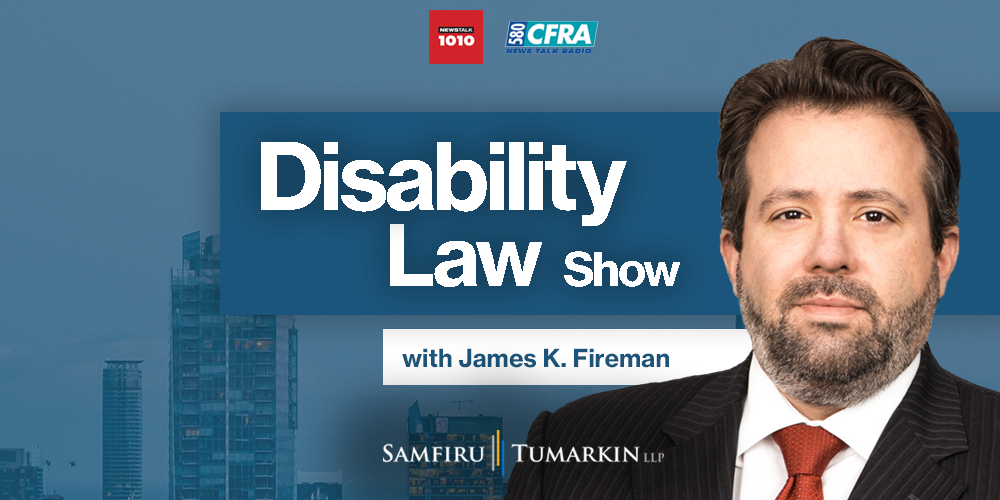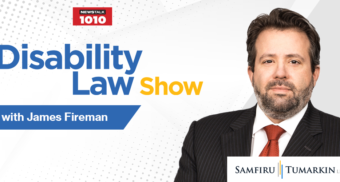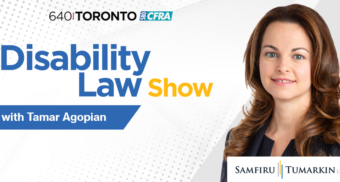Disability Law Show Bell Radio – S4 E02

Episode Summary
Discover your rights and the truth about insurance companies and long-term disability claims on Season 4 Episode 02 of the Disability Law Show on Newstalk 1010 in Toronto.
Listen below to James Fireman, and Tamar Agopian, Toronto disability lawyers at Samfiru Tumarkin LLP, who guide you through the proper steps to take when your insurance provider cuts off your long-term disability or denies your insurance claim. Find out how a disability lawyer in Ontario can help you secure proper compensation.
Listen to the Episode
Episode Notes
I’m being asked to attend a third-party IME and was also asked about my vaccination status by my insurer. I was recently exposed to someone who had COVID-19. Do I have to disclose my status to my insurer?
Generally, a claimant’s vaccination status has nothing to do with their ability and eligibility to receive disability benefits. In some circumstances, however, a claimant’s vaccination status can affect whether or not they are able to attend an assessment or certain treatment. An insurer is within their rights to ask whether or not a claimant is able to attend an assessment. Claimants should be as open and honest with their insurers as possible and speak to their doctor about any recommended health and safety protocols.
I was declined LTD after two and a half years on leave. I am still unable to work. What can I do?
After two years the definition and test in order to qualify for long-term disability benefits changes from a claimant’s inability to work in their own occupation to any occupation. It is very difficult for insurance companies who have previously agreed a claimant is unable to work to cut off benefits. It is important for doctors’ notes and documentation to be as clear and concise as possible in order to prevent any incorrect assumptions by the insurance company.
I have not provided consent to my insurer to communicate with service Canada regarding the status of my CPP Disability application. Can they communicate with service Canada without my consent?
Most disability policies do not require claimants to apply for CPP Disability or provide consent to the disability insurer to speak with CPPD. Claimants should note, however, that an application and approval of CPP disability improve their own claim as the test in order to qualify for CPPD is more difficult. Most policies allow insurers to deduct from a claimant’s benefits if they receive CPPD. Insurers are entitled to take a credit based on an estimated amount of CPPD benefits.
Can disability insurance or private investigators legally get access to your texts, emails, phone records in a lawsuit?
Generally, an insurer or investigator does not have the right to access personal communications in a lawsuit. In some circumstances, however, texts and emails might need to be provided in personal injury lawsuits, such as motor vehicle accidents. Social media it is important to remember, can be largely accessible and there have been cases in which investigators have requested access to claimant’s profiles.
I’ve been on LTD for over 2 and last month my insurance company labelled me totally disabled. They recently told me I need to apply for CPPD. Can the insurance company cut me off if CPPD rejects my application?
Private disability insurers pay monthly disability benefits but in many policies, claimants can and should apply for CPP Disability. The test in order to qualify for long-term disability benefits is typically not as difficult as the test for CPP disability. Claimants who are approved for CPP disability should qualify for long-term disability benefits but the opposite does not hold true as CPPD is a much more strenuous test. Insurers could use a CPPD denial in order to cut off LTD benefits but it is not likely to hold up once legal action is pursued.
I would like to communicate with my insurance adjuster through e-mail solely as I suffer from stress and anxiety and their phone conversations make my mental health worse. What can I do?
Claimants should maintain an open and honest relationship with their insurance adjuster which includes detailed communication. It is important for claimants to remember that refusing to provide insurers with the necessary information will lead to a denial of benefits and prevent claimants from focusing on their health.
LEARN MORE
Dealing with difficult LTD adjusters




